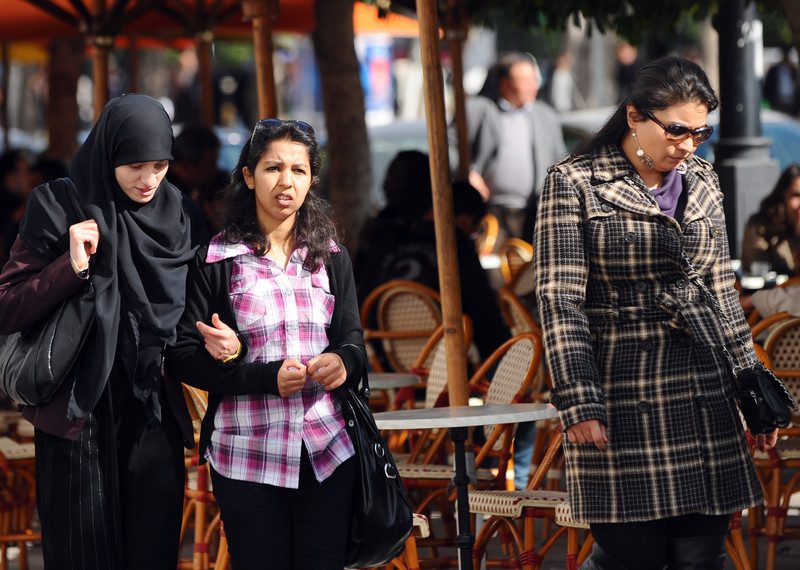Tunisia’s reputation as a leader on women’s rights and gender equality in the region rings hollow when the law still allows rapists to get away with their crimes.
She was raped. To protect her honour now she has to marry her rapist.
He was assaulted, now he stands accused of sodomy.
In Tunisia, if you’re the victim of sexual violence, chances are you will be punished while your attacker walks free.
Too often the law fails you. Too often, you’re told to put up with an abusive husband. Too often, you have no one to turn to for help. Too often, you are told to just deal with it.
This leaves you, the victim – the survivor – on your own. You’ve survived the crime, now you’re a victim of the law.
It’s not what you expect from a country that prides itself as a leader on women’s rights and gender equality in the Arab World. After all, Tunisia legalized abortion on request in 1973, two years before France did.
But the fact is, Tunisia’s success story is an unfinished one. Loopholes in the law still allow rapists to get away with their crimes, women raped by their husbands have no legal protection, and sex between men or between women is still illegal. Isn’t it time Tunisia stopped accusing survivors and started dealing with its flawed laws?

Violence against women rife
Nearly half of all women in Tunisia have experienced violence at least once, according to a survey carried out by Tunisia’s Ministry of Health in 2010. Of them, 15.7% have experienced sexual violence. Add to this the reality that many women are reluctant to talk about sexual violence for fear of being shamed by their families and communities, and the true numbers are likely to be far higher.
The survey also found that spousal and domestic violence were by far the most common. Yet Tunisian law fails to recognize marital rape as rape. On top of this, the law still allows rapists to dodge punishment by marrying their teenage victims – a legal loophole that was recently removed from the law books in Morocco.
Survivors of family violence are often told by the police or their own families to simply “deal with it” or “assume your responsibilities” – suggesting that married women should accept that their husbands abuse them.
Women expected to put up with violence
Despite the many strides forward for women in Tunisia, discriminatory attitudes towards them still persist. Sex is considered a marital duty for both men and women, but in reality, this means that women feel they must submit to their husbands’ demands.
If I say no he forces me and beats me – as long as he gets what he wants.
Anonymous
As one woman told us: “No is not an option, he doesn’t like that, so whatever situation I’m in, whether I’m tired or sick, I have no choice. If I say no he forces me and beats me – as long as he gets what he wants.”
Even if the woman wants to, she has trouble reporting a rape by her husband because marital rape isn’t recognized under Tunisian law. Women who are in abusive relationships fare no better, with the police reluctant to take their complaints seriously.
A 40-year-old woman described to Amnesty how her husband beat her one day: “When we entered the house, he started punching me on the head and the face and beating me with his shoe. My eye was completely blue,” she said. But when she tried to report the incident to the police, she got nowhere.
“I complained at the police station, and got a medical certificate after which the police summoned my husband. But the police officer was a friend of his and nothing happened. The only thing that the police did was to tell him to think of the children.”
The only thing that the police did was to tell him to think of the children.
Woman, aged 40, from Sfax, March 2015
Raped and accused
The police’s response to women is bad enough, but if you’re gay and have sex with a man – which is illegal in Tunisia – the discrimination you face is just as bad, if not worse.
In late 2009, Hedi, aged 37, was arrested and prosecuted for engaging in same sex activity after he reported an assault. He had been pushed into his own car by three men as he was leaving a friend’s house. One of the men raped him, and his phone and money were stolen. The police asked Hedi to sign a statement.

Distracted by his parents’ arrival at the station, he signed without reading the statement. “I was arrested and placed in a cell,” he said. “The three men that assaulted me were placed there as well.”
Hedi told Amnesty that his statement had been changed to say that he had agreed to sex with the three men. He was sentenced to six months in jail but was released four months later after his sentence was reduced on appeal.
I was arrested and placed in a cell. The three men that assaulted me were placed there as well.
Hedi, aged 37
Fighting back
The situation is not all bleak. People in Tunisia are already calling for changes to the law to bring an end to sexual and gender-based violence for good.
The case that started it all was Meriem Ben Mohamed’s. In 2012, she was charged with “indecency” after she filed a complaint against two police officers who raped her.
Tunisians were outraged, taking to social media and street protests until the charges were dropped and the officers brought to trial. Thanks to public support and the support of her family, Meriem was able to see justice done. In 2014, the officers were sentenced to 15 years in jail – an unprecedented outcome in cases like these.
It’s time for Tunisia to stop letting rapists walk free; stop pretending marital rape is not rape; stop jailing men for being gay.
Amnesty International
More recently, the public has rallied around “Marwan”, a 22-year-old student convicted of sodomy charges in September 2015, whose appeal trial is ongoing.
The public outcry, led by Tunisia’s Lesbian, Gay, Bisexual, Transgender and Intersex (LGBTI) activists and backed by local and international human rights and women’s rights defenders, has caused the authorities to sit up and take notice.
The time is ripe for people around the world to champion the calls of Tunisia’s activists. With an extra push, change is within our grasp.
It’s time for Tunisia to stop letting rapists walk free; stop pretending marital rape is not rape; stop jailing men for being gay. Survivors of sexual and gender-based violence are told to deal with it, but isn’t it time Tunisia did?
In August 2014, the authorities promised to protect and support survivors of this kind of violence. Now is the time for Tunisia to make history by making good on that promise.



